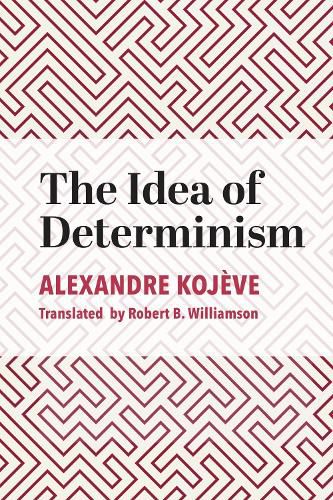Readings Newsletter
Become a Readings Member to make your shopping experience even easier.
Sign in or sign up for free!
You’re not far away from qualifying for FREE standard shipping within Australia
You’ve qualified for FREE standard shipping within Australia
The cart is loading…






The previous volume of Alexandre Kojeve’s (1902-1968) work published by St. Augustine’s Press, The Concept, Time and Discourse (2019), was the introduction to an unfinished magnum opus through which Kojeve intended to effectively update Hegelian philosophy. For Kojeve, Hegel provides the completion of philosophy’s historical development, with the exception of what Kojeve deems an inadequate philosophy of nature. The translation of The Idea of Determinism offers insight into what shape Kojeve’s update to Hegelian philosophy of nature may have taken. The notion of determinism plays heavily in the philosophy of nature. In the classical age of physics (Newton through Maxwell) it was a commonly held assumption that everything can be predicted, and chance is nonexistent. There was also the belief in the perpetual progress toward absolute precision in scientific measurement. Then in 1814 Laplace set the groundwork for this idea in the modern era: [If there were] an Intelligence who could know, for a given instant, all the forces with which nature is animated and the relative position of all the beings that compose it–if, moreover, it were vast enough to submit all its data to analysis [in accordance with the laws of nature–it] would embrace in the same formula the motions of the greatest bodies in the universe and those of the slightest atom: nothing would be uncertain for it, and the future, like the past, would be present to its eyes.
With dialectical mastery, Kojeve examines the implications of these assumptions and finds them wanting, even from within the classical perspective. He then turns to the modern (quantum) physics of Planck, Heisenberg and Dirac, which he sees as supporting an epistemological understanding of physical science free of any deterministic assumptions. Kojeve also finds it to be rooted in the concrete understanding of physical measurement as an interaction between an observing subject and an observed object, about which statistically accurate predictions can legitimately be made.
Kojeve was a contemporary and friend to political philosopher Leo Strauss, and influential in the intellectual formation of Allan Bloom and Stanley Rosen. His political career cannot be ignored when attempting to assess the intentions of his philosophical work, which renders it a brand of political philosophy even when making presentations in the field of natural sciences.
$9.00 standard shipping within Australia
FREE standard shipping within Australia for orders over $100.00
Express & International shipping calculated at checkout
The previous volume of Alexandre Kojeve’s (1902-1968) work published by St. Augustine’s Press, The Concept, Time and Discourse (2019), was the introduction to an unfinished magnum opus through which Kojeve intended to effectively update Hegelian philosophy. For Kojeve, Hegel provides the completion of philosophy’s historical development, with the exception of what Kojeve deems an inadequate philosophy of nature. The translation of The Idea of Determinism offers insight into what shape Kojeve’s update to Hegelian philosophy of nature may have taken. The notion of determinism plays heavily in the philosophy of nature. In the classical age of physics (Newton through Maxwell) it was a commonly held assumption that everything can be predicted, and chance is nonexistent. There was also the belief in the perpetual progress toward absolute precision in scientific measurement. Then in 1814 Laplace set the groundwork for this idea in the modern era: [If there were] an Intelligence who could know, for a given instant, all the forces with which nature is animated and the relative position of all the beings that compose it–if, moreover, it were vast enough to submit all its data to analysis [in accordance with the laws of nature–it] would embrace in the same formula the motions of the greatest bodies in the universe and those of the slightest atom: nothing would be uncertain for it, and the future, like the past, would be present to its eyes.
With dialectical mastery, Kojeve examines the implications of these assumptions and finds them wanting, even from within the classical perspective. He then turns to the modern (quantum) physics of Planck, Heisenberg and Dirac, which he sees as supporting an epistemological understanding of physical science free of any deterministic assumptions. Kojeve also finds it to be rooted in the concrete understanding of physical measurement as an interaction between an observing subject and an observed object, about which statistically accurate predictions can legitimately be made.
Kojeve was a contemporary and friend to political philosopher Leo Strauss, and influential in the intellectual formation of Allan Bloom and Stanley Rosen. His political career cannot be ignored when attempting to assess the intentions of his philosophical work, which renders it a brand of political philosophy even when making presentations in the field of natural sciences.